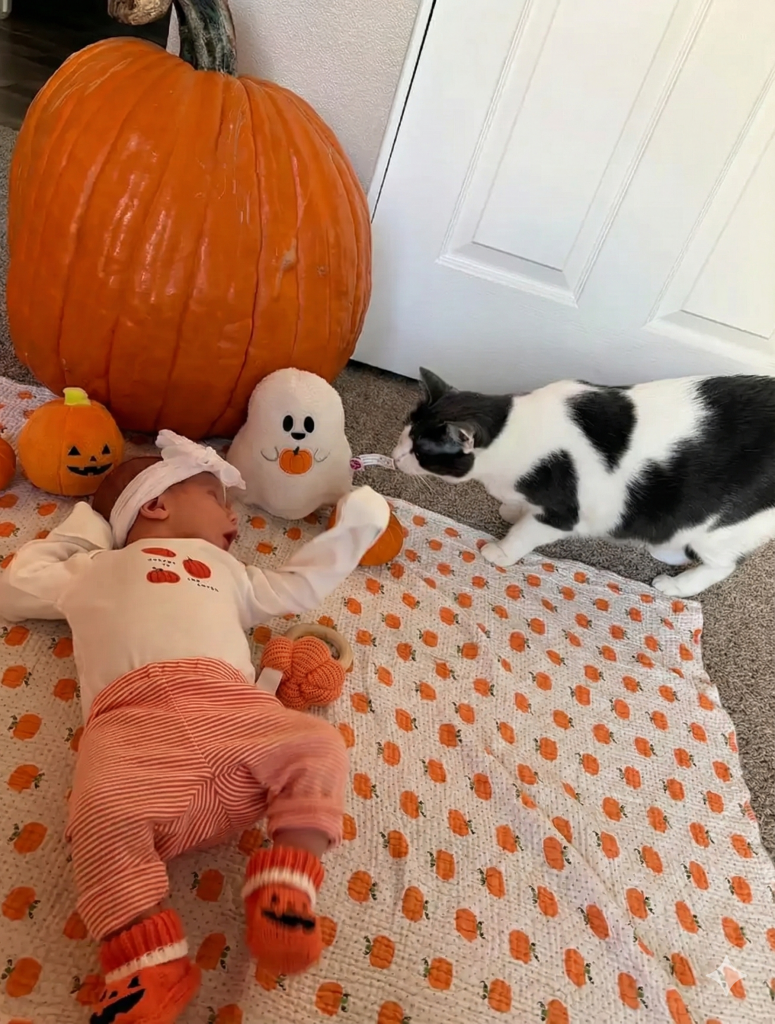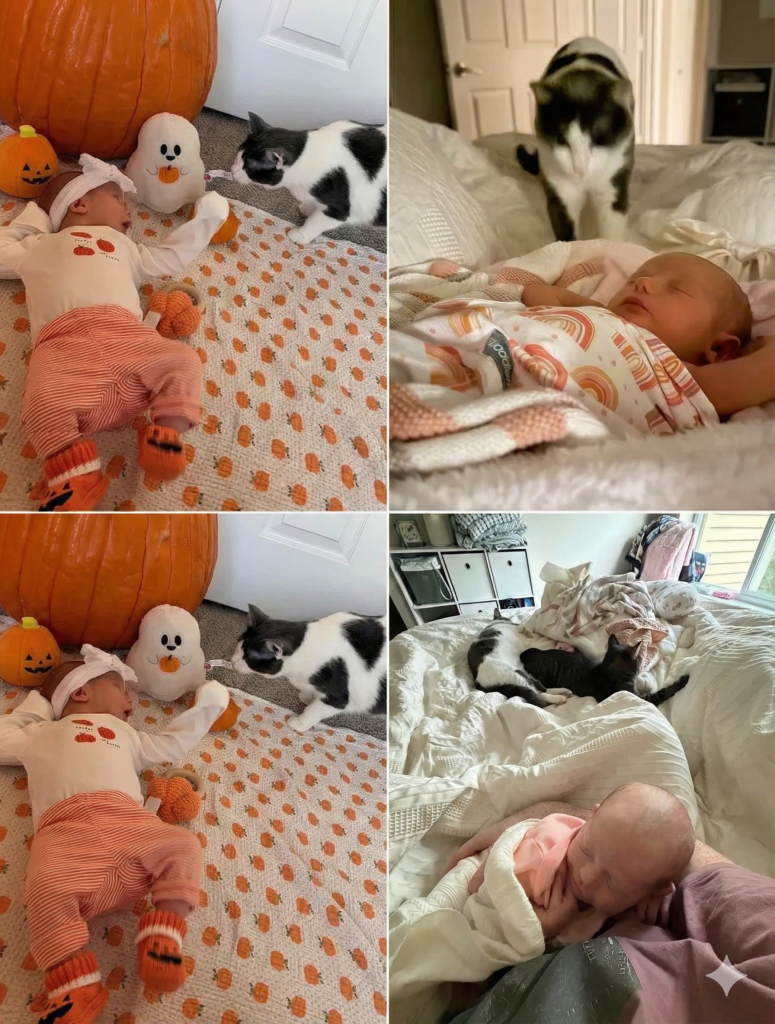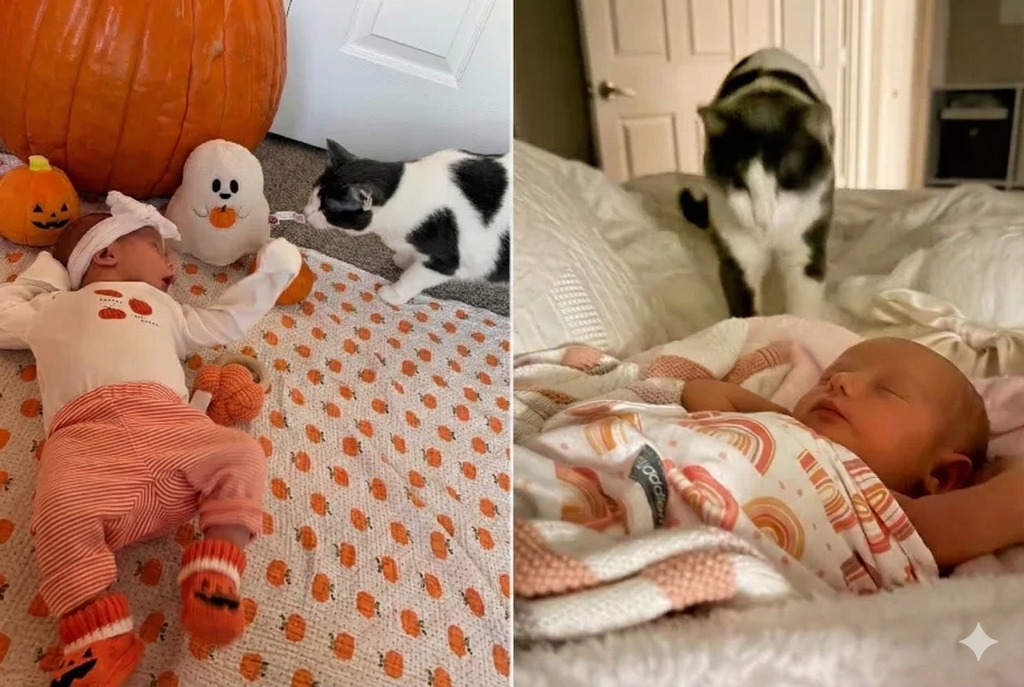Mom Says Her Cat’s “Strange” Behavior While She Was Pregnant Suddenly Makes Sense — And Now the Furry Big Sister Helps the Newborn in the Sweetest, Most Unexpected Way
When Kylie Horn first noticed her cat acting differently during her pregnancy, she didn’t think much of it. She chalked it up to hormones in the house, shifting routines, maybe even the subtle ways animals react to change. But as the months went by, the behavior grew so consistent — so intentional — that she couldn’t ignore it. Her cat, a black-and-white rescue with a gentle face and perceptive eyes, followed her everywhere. Not in the casual, curious way cats often do, but with a kind of quiet determination, as if the animal understood something Kylie herself couldn’t yet put into words.

Now, months later, as Kylie watches her cat curl up beside her newborn, gently touching her tiny socks with the same paws that once kneaded her pregnant belly, she realizes the truth: the cat knew. Long before anyone else, long before baby clothes filled the dresser or the nursery walls were painted, that loyal cat sensed a new life entering the home. And today, she isn’t just a pet — she’s a big sister with a job.
Kylie remembers the first moment she sensed something unusual. During her first trimester, her cat began sleeping pressed against her stomach every night. At first, it was sweet. Then it became surprisingly persistent. “She had never done that before,” Kylie shared. The cat wasn’t clingy by nature. Independent, calm, selective with affection — that’s how Kylie always described her. But suddenly, she wouldn’t leave her side. Anytime Kylie sat down, the cat would climb into her lap. If she walked into another room, the cat followed. When Kylie rested, the cat rested too, often with her head nestling into the curve of Kylie’s growing belly.
Some expectant mothers hear stories like this and smile knowingly. Others brush them off as coincidences. But to Kylie, the shift felt personal. Her cat wasn’t just displaying affection — she was acting like a guardian. And as Kylie’s pregnancy progressed, so did the cat’s behavior. During the third trimester, the cat refused to sleep anywhere except next to Kylie. When Kylie’s husband joked that their cat seemed to be “on duty,” it didn’t feel like an exaggeration. Something about the way she watched Kylie, with eyes fixed and ears perked, felt almost maternal.
The day Kylie went into labor, the cat paced around the house relentlessly, meowing and following Kylie closely. Kylie later said it was as if the animal knew the moment had arrived. Even when Kylie left for the hospital, the cat sat by the door long after they were gone, waiting.
But while Kylie had grown used to her cat’s intense attentiveness during pregnancy, she felt a new wave of uncertainty after bringing her daughter home. She loved her pet — that part was unquestionable — but even the sweetest animals can react unpredictably to new babies. Would she be jealous? Confused? Stressed? Would she retreat? Or worse, act out?
Those first days home were full of the usual mixture of wonder and exhaustion. Late-night feedings, tiny cries, endless diaper changes, and the overwhelming tenderness that comes with holding a newborn. In the haze of those early hours, Kylie kept a watchful eye on her cat, ready to intervene if needed.
But instead of jealousy or confusion, she witnessed something far more touching.
The cat approached the baby slowly, with the same gentle curiosity she had shown throughout the pregnancy. She sniffed the baby’s hat, then the soft blanket wrapped around her tiny shoulders. Then, in a gesture that made Kylie pause and smile, the cat lay down beside the baby — not on top of her or too close to pose a risk — but near enough to feel present. As if to say, “I’m here.”
Over the next few days, it became clear that the cat had assumed a new role in the household. Anytime the baby cried, the cat was the first to respond, padding softly into the room to sit nearby. When Kylie fed her daughter, the cat curled up at her feet. When Kylie placed the baby on a pumpkin-themed blanket to take fall photos, the cat positioned herself beside her, eyes alert and posture protective.
Kylie began noticing moments she never could have scripted. The cat gently nudging a dropped pacifier closer. Sitting beside the bassinet, tail tucked neatly around her paws, seemingly keeping watch. Following Kylie into the nursery at night, settling onto the rug like a silent helper. These little gestures became constant reminders that the bond forming between baby and pet was deeper than she expected.
It wasn’t lost on Kylie that the cat’s “strange” pregnancy behavior now made perfect sense. All along, she had been preparing — preparing to meet the baby, preparing to protect her, preparing to step into a new chapter not just for Kylie’s family, but for herself as well. The cat’s attentiveness had not been random; it was instinct.

Experts say animals, especially cats and dogs, can sense hormonal changes in pregnant women. Their heightened senses allow them to detect shifts in scent, energy, routines, even emotions. For some pets, those changes translate to protective behaviors. For others, curiosity. And in rare, special cases — like Kylie’s — the instinct transforms into a long-lasting bond.
What struck Kylie most was how naturally the connection unfolded. There was no forced introduction, no staged moments, no anxiety-filled monitoring after those first few cautious hours. Instead, the cat stepped seamlessly into her role. She wasn’t simply adjusting to the baby — she was bonding with her.
In many homes, pets remain distant or indifferent to newborns until they grow old enough to play or provide companionship. But Kylie’s cat wasn’t waiting for the baby to get older. She was forming her place in the baby’s world from day one.
Kylie captured many of these early interactions through photos — the cat leaning in close, the baby reaching tiny fingers toward her, the soft warmth of sunlight falling across them both. She shared a few of those images online, not expecting them to resonate as deeply as they did. But almost immediately, other new moms began commenting about similar experiences. “My dog did this too.” “My cat wouldn’t leave my belly during pregnancy.” “This made me cry — our pets just know.”

What Kylie didn’t expect was how much comfort her cat’s presence would bring during postpartum moments of exhaustion. When she was tired from feeding schedules, the cat sat beside her. When she felt overwhelmed, the cat climbed gently onto her lap. And when she watched her daughter sleeping peacefully, the cat would lie down near the crib, eyes half-closed but always attentive.
It wasn’t just companionship — it was emotional support.
As weeks passed, the sweet moments continued. The cat began offering the baby one of her favorite soft toys — not because the baby could play with it yet, but because it seemed like the right thing to do. She would rub her cheek against the baby’s blanket, purring softly as if adding her own comforting scent to the fabric.
Today, Kylie laughs when she remembers how concerned she was about introducing her baby to her cat. The fear feels far away now, replaced with gratitude for the surprising partnership unfolding in her home. “She’s her little guardian,” Kylie says warmly. “She was preparing for her before we even knew it.”
The journey from “strange behavior” to “sweetest bond” is something Kylie will never forget. It transformed her understanding of her pet, of motherhood, of the unspoken emotional world animals share with their families. And it left her with a home filled with even more tenderness than she imagined.
Kylie’s baby will grow up never knowing a world without this cat by her side. And one day, when she’s old enough to understand, Kylie will tell her the full story — how her furry big sister knew she was coming long before anyone else did, and how she welcomed her into the world with the gentlest heart.


